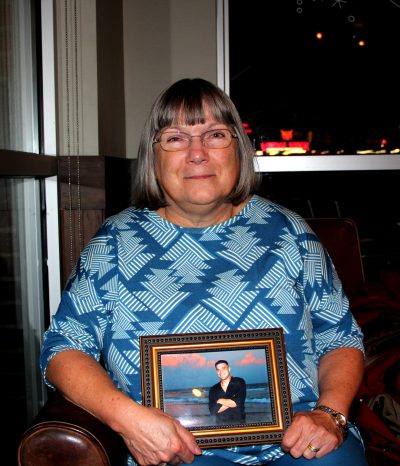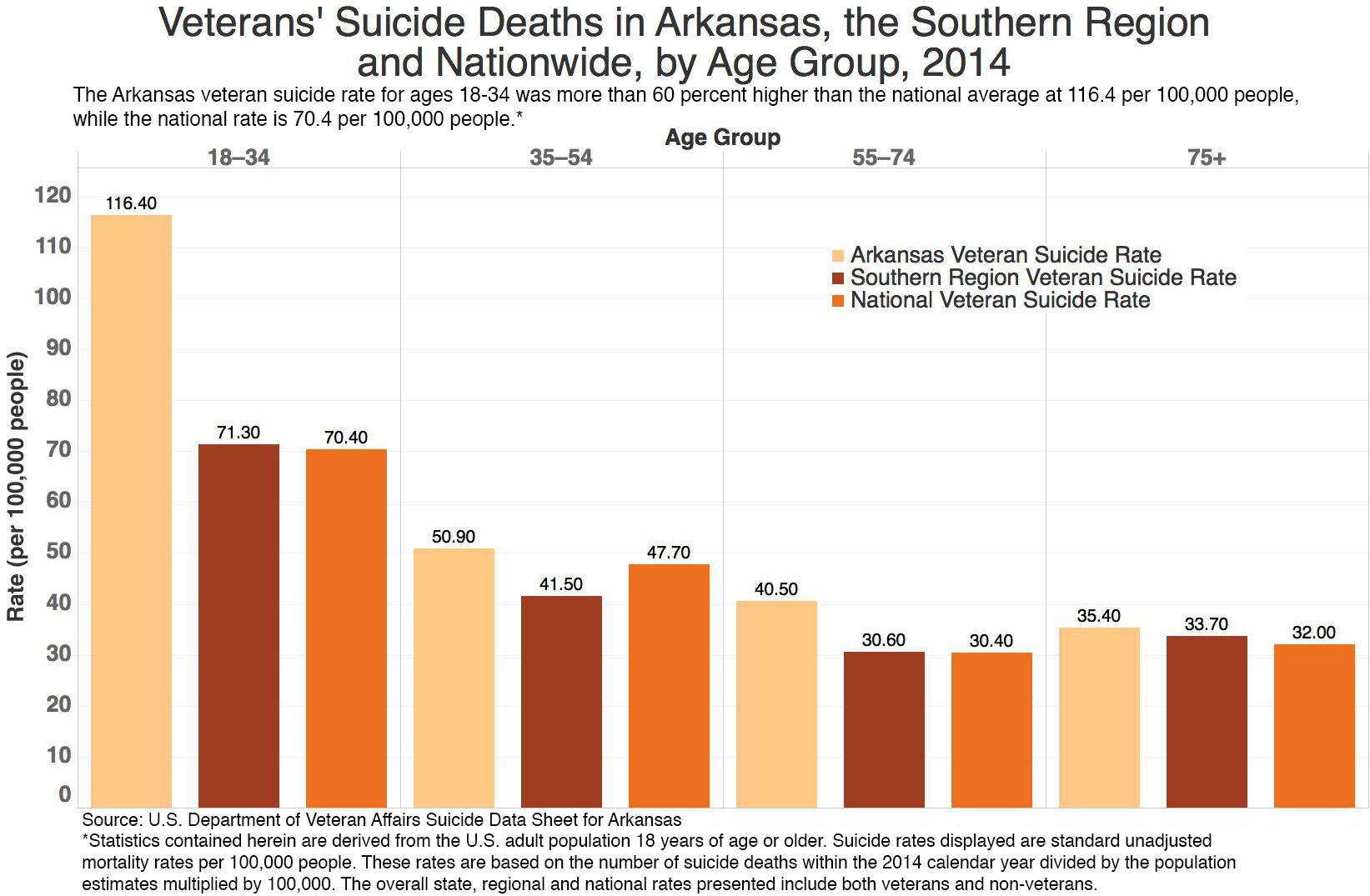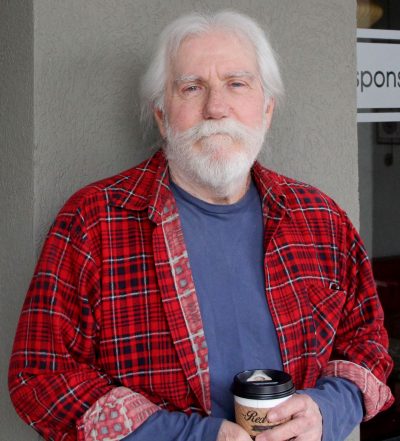Arkansas Veterans Face Higher Suicide Rates
By: Lindsey Guimont and Kayla Nunez
FAYETTEVILLE, Ark. – Arkansas veterans die by suicide 25 percent more often than national averages, with a large spike for younger veterans, a trend blamed on the blend of the state’s rural isolation, veteran mental health challenges and gun availability.
Maureen Cover-Bryan, of Rogers, Arkansas, lost her 30-year-old son, Colin Bryan, to suicide in 2011. He was a U.S. Army veteran paratrooper who suffered from mental illness and substance abuse, common conditions for many of the veterans who die by suicide in Arkansas. Further, his age group is at highest risk: the veteran suicide rate in Arkansas for ages 18-34 was more than 60 percent higher than the national average at 116.4 per 100,000 veterans.

Maureen Cover-Bryan, founder of Ozark Outreach, holds a photo of her son Colin Bryan, a U.S. Army veteran who died by suicide in 2011. Ozark Outreach is a non-profit that will moderate support groups for loss survivors in Benton, Washington, Madison and Carroll counties. Photo by Lindsey Guimont
According to the Veteran Affairs, in 2014 there were 100 veteran suicides statewide. That translates into a rate of 48.1 suicides per 100,000 veterans in Arkansas compared to the national rate of 38.4 per 100,000 veterans. Arkansas has a higher rate than the southern region, which includes 15 states and the District of Columbia.
Cover-Bryan said she thinks the VA and other agencies are doing a lot to prevent veteran suicide now.
“All (military) active duty are getting ASIST (Applied Suicide Intervention Skills Training) trained, so that’s really important in suicide prevention,” she said.
Dr. Mark Worley, chief of staff at the Veterans Health Care System of the Ozarks in Fayetteville, said one way to reduce suicide is to get veterans in contact with the VA health system.
“If they’re being followed in the VA, their chance of suicide is actually lower than those veterans who are not being seen,” Worley said.
“They say that there are 20 veterans dying by suicide a day but only six of them are seen at the VA,” he added. Worley said suicide is often associated with three things, all of which are common to rural areas: access to guns, lack of social contacts, and drug or alcohol issues.
About half of suicides are completed by a firearm nationally, but Arkansas veteran suicides by firearm are at 72 percent.
To address the mental health issues, the Veterans Health Care System of the Ozarks offers 19 treatment programs, with post-traumatic stress disorder being a common ailment, said Brian Moore, Fayetteville VA acting chief of mental health.
Everyone at the VA is responsible for raising mental health awareness, Moore said. The VA has taken such steps as to link each employee computer at the hospital with steps on how to talk to a suicidal veteran.
“The first thing is to listen to the veteran,” Moore said. “Truly meet the veteran where they are in finding out what’s going on with that veteran and staying with them the whole time.” This means staying on the phone with the veteran or physically staying with them until a mental health professional can take over.

There are also mental health support groups that meet at the VA and suicide prevention coordinators do presentations about mental health at community events to get the word out about veteran suicide.
It’s important to remember that everyone has a different situation and it’s impossible to generalize what mental illnesses look like, Moore said.
“Not everyone with a mental illness has suicidal ideation and not everyone with suicidal ideation has a severe mental illness,” Moore said. Suicidal ideation refers to thoughts about how to kill oneself.
Veteran Derrick Calhoun said he never noticed any warning signs that his friend, Wesley Webster, was suicidal or was having any mental health issues. Webster, who worked with Calhoun on fighter jets in the Navy, died from suicide in 2015.
“He was generally a happy guy most of the time,” Calhoun said.
Navy personnel are trained to detect suicide warning signs but Calhoun said Webster showed none of those signs. Calhoun and Webster worked together on fighter jets and were with each other every day.
“I still keep a picture of him,” he said, showing the two of them together after they finished work one day.
Because of this, Calhoun said he’ll never want a friend who is feeling suicidal to feel alone to need to talk with someone. “That’s why I now always answer the phone when someone is calling.”
Ashley Moffett, suicide prevention coordinator at the Fort Smith VA, said that there is still a stigma about mental health disorders and suicide. That’s why the Fort Smith VA educates the public about these issues through various programs, such as cookouts for veterans and their families. She said it’s important for veterans to get out and socialize with people who have been through similar experiences.
“I think people are scared to talk about suicide,” Moffett said. “We have to do a better job of educating.”
At the VA, Moffett helps provide ongoing and intense therapy for suicidal veterans as part of her job duties but she also hosts events in her free time to help improve veterans’ mental health.
She helps run The Wellness Group, a group of veterans that meets on Fridays to socialize and exercise to help improve mental health. The group takes walks together and goes cycling. Anywhere from 10 to 30 veterans show up, Moffett said.
“People are reaching out every day and we have to be ready to help,” she said. “Our motto is be there and we really do have to be there for people.”
The Fayetteville VA also has a biking group that helps veterans who may be dealing with a mental illness socialize with their peers on a regular basis. Other outreach resources include the VA’s Veterans Crisis Line, a national line for veterans to call or text to receive help if they are in crisis.
Soldier on Service Dogs is a nonprofit organization in Fayetteville that trains service dogs and gives them to veterans who have been diagnosed as having PTSD and traumatic brain injuries.
Elise Burt, Soldier on Service Dogs veterans program manager, said the dogs help keep the veterans company and, paired with mandatory counseling, can help prevent suicide.
“We have one veteran who will tell you he thought about suicide every day until got his dog,” Burt said.
Maureen Cover-Bryan said she created Ozark Outreach because of the lack of support groups for loss survivors.
“I hope to have a Washington County support group by January and then move into Madison and Carroll counties,” she said.
She said she thinks that suicide prevention and awareness for all should start in schools, so that everyone can be informed and comfortable with the topic.
“They need to be able to talk about it,” Cover-Bryan said. “They need to be able to say the word suicide without everyone flinching.”
Music Therapy Helps Fayetteville Vets Cope With Trauma
By Lindsey Guimont and Kayla Nunez
Jim Hale, a U.S. Army veteran with post-traumatic stress disorder, is using music to help grapple with the loss of his friend, fellow veteran Jacob George, to suicide in September 2014.

U.S. Army veteran Jim Hale, 71, uses Soldier Songs and Voices as a coping mechanism for his PTSD. They perform regularly at the VA Medical Center in Fayetteville, Ark. Photo by Lindsey Guimont
Hale is involved with a program called Soldier Songs and Voices, a national outreach program that connects veterans to musicians for free music lessons. The Northwest Arkansas chapter has performances regularly at the VA hospital in Fayetteville, Veterans Health Care System of the Ozarks, in the lobby and mental health building.
George was a U.S. Army veteran who founded Operation Awareness, an organization that sponsored “A Ride to the End.” This was a group of veterans who pledged to ride bicycles across the country raising awareness until the war ends. George was also a musician and Hale felt that Soldier Songs and Voices may have been able to help him but it was started after his death, Hale said.
“Music does heal. So I think that’s what Soldiers Song is about and the people at the VA have been looking for things like that. They’re making an effort to find ways to improve lives,” he said.
Hale said the Fayetteville VA hospital has been making efforts to make more activities and programs available to veterans like service dogs and horses, fly fishing, music, meditation and cycling.